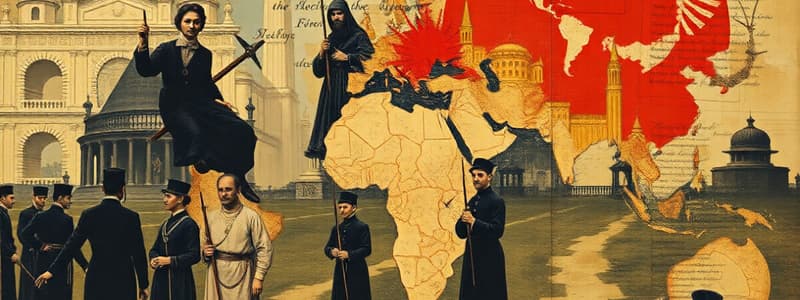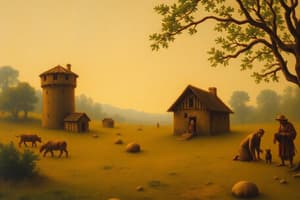Podcast
Questions and Answers
What characterized the agricultural village societies of the Igbo and Iroquois?
What characterized the agricultural village societies of the Igbo and Iroquois?
- Egalitarian kinship societies without state systems (correct)
- Highly stratified societies with clear class divisions
- Nomadic lifestyles and hunting-gathering economies
- Centralized state systems with monarchies
Which aspect was a significant factor in the Ming Dynasty's economic boom?
Which aspect was a significant factor in the Ming Dynasty's economic boom?
- Emperor Yongle's support for cultural innovations
- Open trade policies with Europe
- Dominance of military conquests in Asia
- Confucianism and strong anti-Mongol policies (correct)
What did Zheng He's voyages primarily demonstrate about Ming China?
What did Zheng He's voyages primarily demonstrate about Ming China?
- Maritime prowess and diplomatic outreach (correct)
- The significance of land-based trade routes
- A focus solely on military expansion in Asia
- Isolationist policies in response to foreign threats
Which of the following statements best describes the relationship between the Sunni Ottomans and Shia Safavids?
Which of the following statements best describes the relationship between the Sunni Ottomans and Shia Safavids?
What was a key feature of the Aztec Empire's political structure?
What was a key feature of the Aztec Empire's political structure?
How did the Inca Empire manage its large population spread over 2,500 miles?
How did the Inca Empire manage its large population spread over 2,500 miles?
What was the main reason for Portugal's early lead in maritime voyaging by 1415?
What was the main reason for Portugal's early lead in maritime voyaging by 1415?
Which of the following best describes the political unity in the Songhay Empire?
Which of the following best describes the political unity in the Songhay Empire?
What was a notable aspect of the social structure within the Inca Empire?
What was a notable aspect of the social structure within the Inca Empire?
Which of these factors did NOT contribute significantly to the maritime expeditions of the European states in the 15th century?
Which of these factors did NOT contribute significantly to the maritime expeditions of the European states in the 15th century?
Flashcards
Agricultural Village Societies
Agricultural Village Societies
A form of agriculture where societies live in villages, maintain egalitarian social structures, and lack formal state systems.
Igbo Political System
Igbo Political System
The dominant political and social system of the Igbo people, characterized by decentralized governance through age-grades and kinship networks.
Great Law of Peace
Great Law of Peace
A written code of laws and principles among the Iroquois Confederacy, emphasizing peace, unity, and justice.
Ming Dynasty China (15th Century)
Ming Dynasty China (15th Century)
Signup and view all the flashcards
Emperor Yongle
Emperor Yongle
Signup and view all the flashcards
Zheng He's Voyages
Zheng He's Voyages
Signup and view all the flashcards
European Renaissance
European Renaissance
Signup and view all the flashcards
Aztec Empire (Mexica)
Aztec Empire (Mexica)
Signup and view all the flashcards
Tlacaelel (1398-1480)
Tlacaelel (1398-1480)
Signup and view all the flashcards
Mita System
Mita System
Signup and view all the flashcards
Study Notes
Power World History - Chapter 12: The Worlds of the Fifteenth Century
- The chapter covers the fifteenth century, exploring various societies and civilizations around the world. Different regions had varying forms of social organization, political structures, and cultural expressions.
- This period saw the meeting of previously isolated parts of the world, leading to significant interactions.
The Shapes of Human Communities
- Paleolithic Persistence: Gatherer-hunter societies in Australia and North America still practiced these traditions, demonstrating adaptability and environmental management. Some groups displayed complex social structures and trade networks.
- Agricultural Village Societies: Egalitarian kinship societies existed among the Igbo and Iroquois. While some lacked centralized states, they maintained trade and governance systems (i.e., the Iroquois' "Great Law of Peace").
- Pastoral Peoples: Pastoral groups like the Timur/Tamerlane (d. 1405) in Central Asia and the Fulbe in West Africa were significant. Samarkand was a notable center in this region.
Civilizations of the Fifteenth Century: Comparing China and Europe
- Ming Dynasty China: Emperor Yongle (r. 1402-1422) presided over a period of Confucian policies, economic growth, and remarkable maritime expeditions led by Zheng He (1405-1433).
- European Comparisons: Europe witnessed smaller, warring states alongside the rise of Renaissance humanism.
- Maritime Voyages: The Portuguese took the lead in maritime exploration after 1415, utilizing smaller ships and fleets in contrast to the large Chinese expeditions. Motivations, goals, and support for these voyages also differed.
Civilizations of the Fifteenth Century: The Islamic World
- Ottoman and Safavid Empires: The Ottomans were powerful and long-lasting, challenging Europe in 1453. The Shia Safavids clashed with the Sunni Ottomans, representing religious and political differences within the Islamic world.
- Songhay and Mughal Empires: Islam's influence extended across trade routes (trans-Sahara trade) and into India. Religious diversity characterized India and, in Southeast Asia, Muslim merchants and Sufi mystics engaged in trade. Malacca was a pivotal trading point.
Civilizations of the Fifteenth Century: The Americas
- Aztec Empire (Mexica): The Mexica, a conquest state, had a complex social and political system, centered at Tenochtitlan with important market centers. During the time of Tlacaelel (1398-1480), the ideology of human sacrifice played a prominent role.
- Inca Empire: A vast empire spanning 2,500 miles with a population of 10 million. A sophisticated state bureaucracy managed resettlement and standardized the Quechua language. The mita system was a significant labor system. Gender parallelism existed in their society, but equality was not achieved.
Webs of Connection
- The fifteenth century saw increased maritime trade and well-established long-distance trade routes, fostering connections between different cultures and empires.
A Preview of Coming Attractions: Looking Ahead to the Modern Era, 1500-2012
- Global trade expanded but wasn't fully realized by 1500. Afro-Eurasia, the Americas, and Oceania were increasingly connected.
- The industrial revolution profoundly changed societies, and population growth accelerated. Urbanization, commercialization, literacy, and the modern era followed.
Reflections: What If? Chance and Contingency in World History
- The chapter poses hypothetical scenarios and questions about historical events showcasing the importance of chance, individual decisions, and historical contingency. Specific examples include the death of Great Khan Ogodei, scuttling the Ming fleet, and the siege of Vienna.
Studying That Suits You
Use AI to generate personalized quizzes and flashcards to suit your learning preferences.




